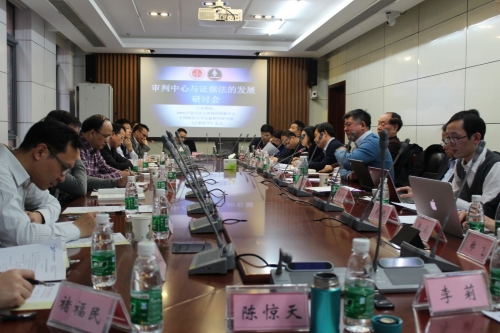
On Dec. 6th, 2015, a seminar on the development of the trial-centered theory and evidence law, which was co-sponsored by the "2011 Plan" China Collaborative and Innovation Center of Judicial Civilization, Institute of Evidence Law and Forensic Science of CUPL, Journal of Evidece Science, was held in Beijing. More than 40 experts and scholars from universities, research institutions and practical departments such as Peking University, Tsinghua University, the Supreme People's Court, Renmin University of China, Beijing Normal University, Sichuan University, Hunan University, China University of Political Science and Law, People's Public Security University of China, University of International Business and Economics, National Judges College, Beijing Jiaotong University, Research Office, Beijing First Intermediate People's Court, Magazine of People·Rule of Law, Magazine of The People's Judicature, gathered and conduct an in-depth discussions on the subject of the Development of the Trial-centered theory and Evidence law.
The vice-president of Institute of Evidence Law and Forensic Science of CUPL, Professor Zhong Zhang hosted the opening ceremony and the first segment. In the opening ceremony Professor Baosheng Zhang, the co-chair of Collaborative and Innovation Center of Judicial Civilization and honorary president of Institute of Evidence Law and Forensic Science of CUPL, gave a brief introduction to the background and meanings of holding this seminar as well as made a speech on the topic of "Evidentiary adjudication is the mean to perform Trial-centered theory". He talked about the relationship between Evidentiary adjudication and Trial-centered theory, explicitly indicating that evidentiary adjudication is the mean to perform the trial-centered theory, mainly focused on the premise, condition and consequence of evidentiary adjudication, pointing out that we are now facing many problems such as lack of evidence legislation, obscurity of cross-examination and confrontation regulations, and nominal witnesss testimony.
The first segment of this seminar began with a speech on the subject of the "Essentialism of court trial and the improvement of evidence system" delivered by Professor Chongyi Fan, the honorary president of CUPL Procedural Law Research Institute and the honorary director of Key Laboratory of Evidene Law and Forensic Science, Ministry of Education. Professor Chongyi Fan hold that in China judgement centralism has seen its dawn of development, while it hinges on the essentialism of court trial and the improvement of evidence system to finally achieve judgement centralism. Professor Weidong Chen from Renmin University of China raised a discussion about evidence cerification and delivered a speech about "Evidence cerification in the perspective of judgement centralism". Professor Ruihua Chen from Peking University made his point about which to choose when statements in court and transcripts out of court have conflicts and discussed on the topic "Investigation files and the essentialism of court trial". Huiling Jiang, the Deputy director of Supreme People's Court Research Office and the head of Institute of Law Application, presented a speech regarding "Research on the development of trial-centered theory and evidence law". Then, Dr. Xinhua Zeng read the report of "Several problems on promoting the reform of trial-center" on behalf of Professor Guangzhong Chen. Eventually, Associate Professor Xiaona Wei from Renmin University of China, Professor Pinze Zhang from People's Public Security University of China and Professor Pengpeng Shi from CUPL delivered speeches according to the subject.
The seminar came into the second segment which was hosted by Associate Professor Xunhu Li from Institute of Evidence Law and Forensic Science, CUPL. In this segment, Professor Weimin Zuo from Sichuan University hold that the raise of judgement centralism provides conditions for developing the evidence law and he also proposed constructive suggestions for the development and reform of evidence system under the background of trial-center. Professor Youping Xie from Fudan University put forward "The requirement that judgement centralism has for the evidence system of China". Based on the empirical research, Professor Jianwei Zhang from Tsinghua University discussed in details on the impetus and obstruction during evidence law development under the background of trial-center. Judge Weiping Zhou from the Beijing First Intermediate People's Court gave several suggestions on putting the lawsuit system of trial-center into practice. In the end, Professor Xuequan Chen from University of International Business and Economics, Associate Professor Weimei Zheng from National Judges College and Associate Professor Xiaozheng Lei from Beijing Normal University delivered speeches according to the subject.
In the last segment, Professor Baosheng Zhang expressed gratitude to the experts and scholars and made a final conclusion. During this seminar, a lot of creative ideas and views have been put forward and different theory explorations have been gathered together, which will help to promote the evidence law development and the trial-centered lawsuit system reform in China.